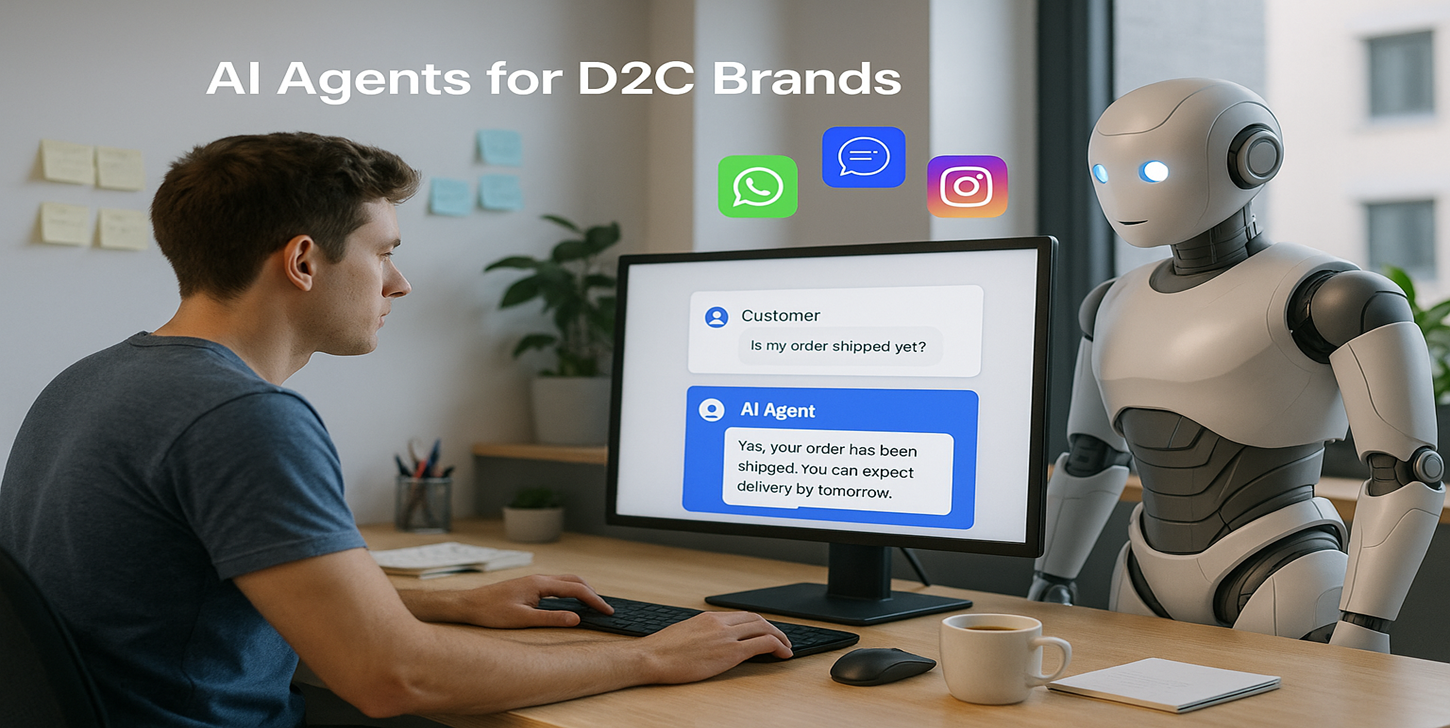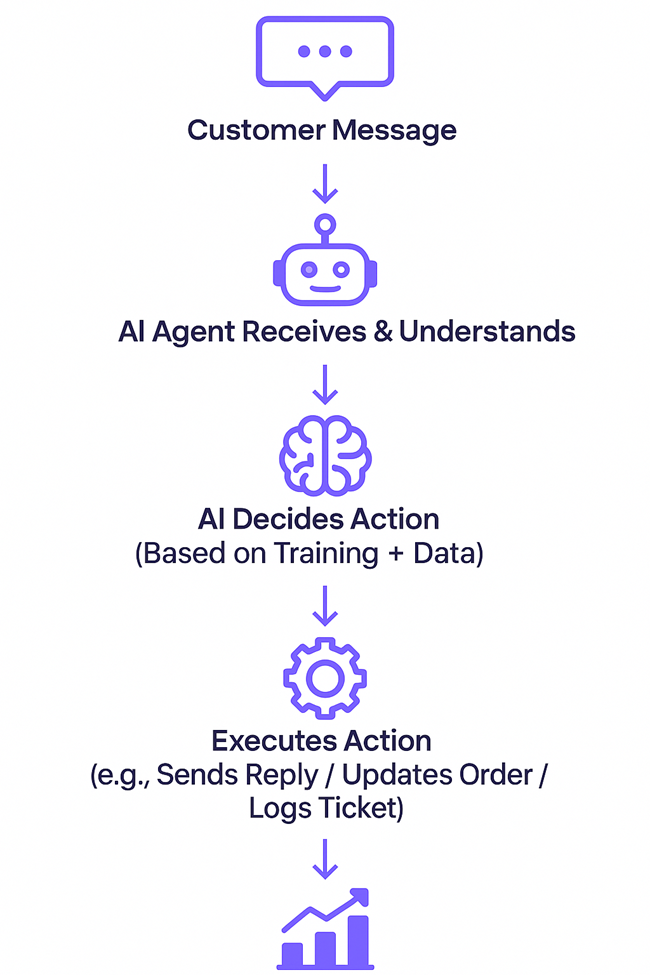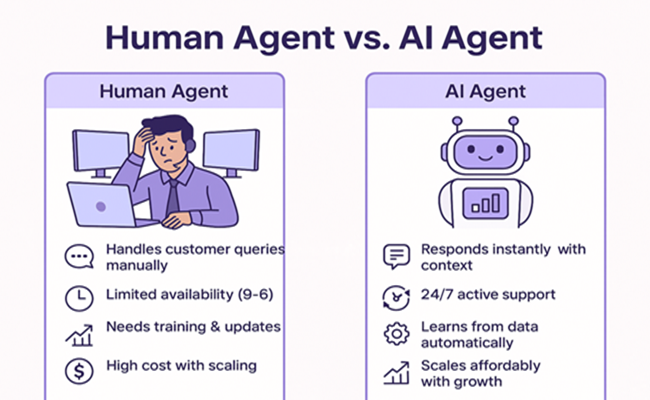
AI Agents for D2C Brands: How to Get Started
Table Of Content:
1. Introduction: Why D2C Brands Need AI Help
2. What Are AI Agents?
3. Human Agents vs. AI Agents (Visual Comparison)
4. Key Benefits of AI Agents for D2C Brands
5. Real-Life Use Case: DesksterAI in Action
6. Step-by-Step Guide: Getting Started with AI Agents
7. Final Thoughts: Digital Team That Never Sleeps
8. Frequently Asked Questions (FAQs)
AI Agents for D2C Brands: How to Get Started
For D2C brands, keeping customers happy across platforms is a daily challenge.
You’ve got orders coming in from your website, messages on WhatsApp and Instagram, and questions collected in email. Managing all of this manually gets messy — fast.
That’s where AI agents step in.
They help you instant reposnse, stay organized, and provide the kind of experience today’s buyers expect. If you’re new to this, here’s a simple breakdown of what AI agents are and how to start using them in your D2C business.
What Are AI Agents?
AI agents are software programs that can chat with your customers, answer questions, track requests, and take actions — all on their own.
Unlike regular chatbots that follow scripts, these tools learn from behavior. They can suggest products, follow up after an order, or help solve issues without needing a human every time.
In platforms like vCX, AI agents are trained using your support data and flows. That means your customers get faster help, and your team saves hours every day.
Human Agents vs. AI Agents (Visual Comparison)
Why D2C Brands Are Moving to AI Agents
Direct-to-consumer brands thrive on fast service. Whether it’s a delay update, a product inquiry, or a return question — every second counts.
AI agents help by:
- Handling common queries across channels
- Sending updates or reminders at the right time
- Learning from chat history to offer better replies
- Reducing manual support load for your team
This means fewer tickets, quicker replies, and happier customers.
A Simple Example: How a D2C Brand Used DesksterAI
An apparel brand used to handle all support manually.
After launching DesksterAI, they automated replies on WhatsApp and web chat. Their AI agent started answering questions like “Where’s my order?” and “How do I exchange this?” — in real time.
As a result:
- Support response time dropped by 70%
- The team could focus on bigger issues
- Repeat customer satisfaction improved
How to Get Started with AI Agents

You don’t need to be technical to start. Here’s how to do it:
- Pick one platform you want to automate — like WhatsApp or your website
- Choose an AI agent tool like vCX
- Set up basic replies and flows
- Test with real users and adjust based on feedback
The best part? You can always start small and build as you go.
Final Thoughts: AI Agents Are Your Digital Team
For D2C brands, staying responsive is no longer optional — it’s expected.
AI agents help you stay connected with your customers without burning out your team. They don’t replace humans, but they take care of the boring, repeatable stuff so your team can focus on what matters.
Want to see how this fits into your brand? Visit Versalence.ai and explore your options.
🤖 Frequently Asked Questions (FAQs)
1. What’s the difference between a customer service chatbot and an AI chatbot?
A traditional customer service chatbot typically follows a fixed script and handles basic queries like order status or return policy. On the other hand, an AI-powered chatbot can understand context, learn from past interactions, and handle more complex conversations—making it smarter and more helpful over time.
2. Can AI agents support omnichannel customer service?
Yes. Modern AI chatbot customer service platforms are built to manage conversations across WhatsApp, Messenger, Instagram, and web chat—all from one place. This omnichannel customer service approach ensures that no matter where a customer messages you, they get a consistent and timely experience.
3. Are chatbots in Messenger still effective for D2C brands?
Absolutely. Chatbots in Messenger remain highly effective for product queries, personalized recommendations, and automated follow-ups. Combined with AI, they can deliver a more conversational and human-like experience while reducing manual support work.
4. How do AI agents fit into workflow automation?
AI agents can be integrated with your workflow automation software to trigger actions like order tracking updates, ticket creation, or email notifications. This helps streamline repetitive tasks and ensures your operations run smoothly without constant human oversight.
5. Do you offer localized AI chatbot services in cities like Hyderabad or Bangalore?
Yes. We’ve helped multiple businesses set up AI-powered chatbots in Hyderabad and Bangalore, especially for industries like eCommerce, healthcare, and ed-tech. Our bots are tailored to regional customer needs, languages, and support flows.
